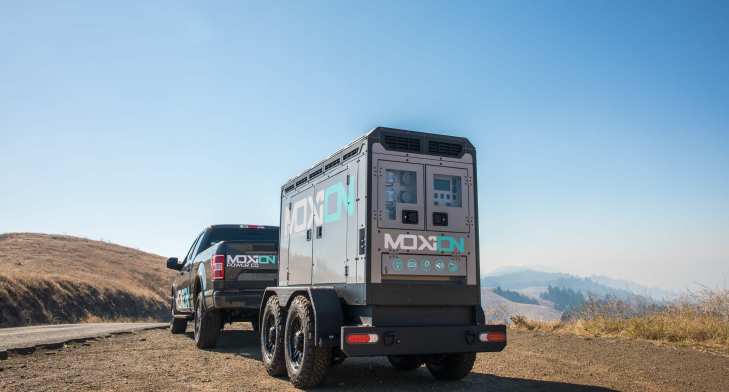Paul Huelskamp and Alex Meek were hiking near Mount Tamalpais in Marin County a few years ago when the peaceful quiet of the woods began to give way to the clatter of a diesel generator. When they came upon it, they saw it “spewing black smoke” into the otherwise cool, crisp air, Huelskamp recalled.
The generator had been deployed to provide power during one of the many public safety shutoffs imposed by California’s utilities to prevent wildfires, and Huelskamp was struck by the inanity of it all.
“As we walked past this thing, I was like, ‘Alex, look at this machine — isn’t it ridiculous that this is what we use when we need electricity? We have to burn diesel fuel in an engine and throw that mechanical energy through an alternator to generate electrons.’ It’s absolutely ridiculous,” he said.
The pair talked about how batteries are poised to disrupt a number of industries, so why not portable power generation?
“We continued that thought experiment for a couple of weeks, and we couldn’t really really let it go,” Huelskamp said. Together, they founded Moxion Power in 2020 along with Alex Smith and Jed Mickle, and in 2021, they joined Y Combinator as part of the winter cohort.
Today, Moxion landed a $100 million Series B led by Tamarack Global with participation from Series A lead investor Energy Impact Partners. Other investors include Sunbelt Rentals, Amazon’s Climate Pledge Fund, Microsoft’s Climate Innovation Fund, Enterprise Holdings Ventures, Marubeni Ventures, Suffolk Technologies and Rocketship.vc.
Sunbelt Rentals stands out in that list because the company owns a massive number of diesel- and gasoline-powered generators that provide electricity to construction sites, film locations, concert festivals and more.
For those applications, diesel generators are currently the least-bad option for electricity on site. They’re widely used because they are portable, temporary and cost-effective relative to running fixed power lines. Sunbelt has committed to buying Moxion’s generators through 2025.
Moxion is betting that rental companies and other high-use customers will be eager to ditch diesel generators altogether. “Battery technology is still quite a bit more expensive up front, but there’s a major operational cost advantage,” Huelskamp said.
On many sites, generators run idle for a significant portion of the day, consuming massive quantities of fossil fuels that go wasted. Turning the units on and off is both tedious and disruptive to work on site, and frequent starts and stops can increase wear and tear on the engine.
Batteries, on the other hand, can turn on and off in a millisecond. Plus, they’re low maintenance and highly efficient. “There’s not a whole lot that breaks inside of a battery,” Huelskamp said.
But, as Huelskamp acknowledged, batteries are expensive upfront. The only way they save customers money is when they’re used frequently so that the lower running and maintenance costs can more than offset the sizable upfront costs. That’s why Moxion is focusing on portable generators that are used day in and day out as opposed to backup generators that might be used a handful of times per year.
The company’s current designs use lithium-iron-phosphate (LFP) cells, though Huelskamp said his company is “relatively agnostic to cell chemistry and form factor.” Moxion designs, engineers and builds its products in Richmond, California, an approach that he said allows the company to be responsive to market demands and upheavals, including the supply-chain disruptions that have defined the last couple of years.
Moxion’s first product will be a midsized generator in the 20 kV to 100 kV range that Huelskamp said will provide the same runtime as an equivalent diesel generator. The current investment will go partly to scaling up production. Its first plant is currently under construction in Richmond, California, and it will bring its second online in 2024. Combined, they’ll produce over 7 GWh of generators annually.
When one of Moxion’s generators runs low on power, it’ll be swapped out for a new one. Back at a central location, the empty one will be charged either at Level 2 or DC fast speeds, depending on how quickly it needs to be turned around for another job. Huelskamp said that the company is looking to recharge all its generators using renewable power, either from on-site or through power purchase agreements. The company is also developing software and telematics to predict when its generators will need to be recharged and how quickly to charge them.
“It’s going to be a heavily automated decision-making process in terms of when to dispatch drivers, where they go and when,” Huelskamp said.
The hope is that customers never know the difference between their old diesel generator and the new battery one — except the new one will be nearly silent and won’t pump the air full of noxious fumes.
